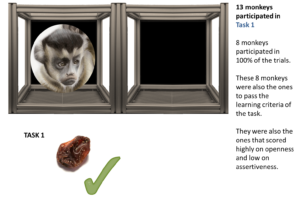When studying animals in the wild or in captivity it is very easy to unintentionally create selection biases even when we are aware of them and try to collect data in a random fashion. One particular factor that may cause a bias is the personality of our animals.
Personality is defined as – consistent differences in an individual’s behaviour and decision making over time. Thus if we are studying animal cognition the animal’s personality will have an impact on how we get and interpret the results of our studies.
Selection biases may occur for variety of different reasons
- Self-selection of study subjects – The animal chooses to take part.
- Targeting a specific area/population
- Ending a study once you get the desired result
- Excluding data on arbitrary grounds.
A recent study by Blake Morton, Prof Phyllis Lee and Prof Hannah Buchanan-Smith of Stirling University tested to see if the capuchins at Living Links had any specific personality traits and if so did that affect how much they participated in research and also how well they performed.
The research indicated that our capuchins do have at least 5 different personality dimensions, shown in the table below.
The researchers then examined if these personalities affected their participation and performance in our studies so they created two tasks for the monkeys.
Task 1 – The monkeys had to choose which cubicle to enter. If they chose the one with the reward in front of it they received the reward. If they chose the one without a reward they did not receive anything.
Task 2 – The monkeys had to choose which cubicle to enter. If they chose the one with the larger cup in front of it they received the reward. If they chose the one with the smaller cup they did not receive anything.
In both tasks the monkeys that scored higher on ‘openness’ and lower on ‘assertiveness’ performed better at the tasks and were also more likely to participate in the trials.
This is a very interesting result so we decided to ask Blake a few questions about the study.
Science Communication Officer (SCO) – Is there any way to avoid a personality selection bias in cognitive studies?
Blake – One possibility would be to classify subjects according to their personalities, then test for differences in task performance within those groupings. However, most studies of animal cognition do not have access to large study populations, and must therefore rely on using small sample sizes. At this point in time, we encourage researchers to consistently report the existence (or lack thereof) of a personality bias in subjects selected for testing.
SCO – Why do ‘open’ individuals perform better than ‘assertive’ individuals?
Blake – Open individuals are typically more curious and willing to engage in tasks. As a consequence, they often perform better than less Open individuals. As for Assertiveness, one intriguing possibility, which we discuss in our paper, is that more aggressive individuals (called ‘Assertive’ in our study) have a tendency to emphasize speed over accuracy when making decisions. Thus, as a consequence of such hasty decision-making, aggressive individuals may be more likely to score incorrectly on trials. To formerly test this latter possibility, however, further research on the Living Links capuchins will be necessary.
SCO – Are there any cognitive studies that would benefit from having a bias towards ‘open’ individuals?
Blake – Based on our study and others, individuals that score higher on Open traits (e.g. curious, active) typically are more willing to engage in experimental research. As a consequence, they generally learn faster and perform better on tasks compared to less Open individuals. Thus, from a logistical point of view, yes, a study might benefit from having a bias towards more Open individuals because it potentially means that less training/testing is needed. However, as we discuss in the paper, caution should be used when comparing data to other studies.



